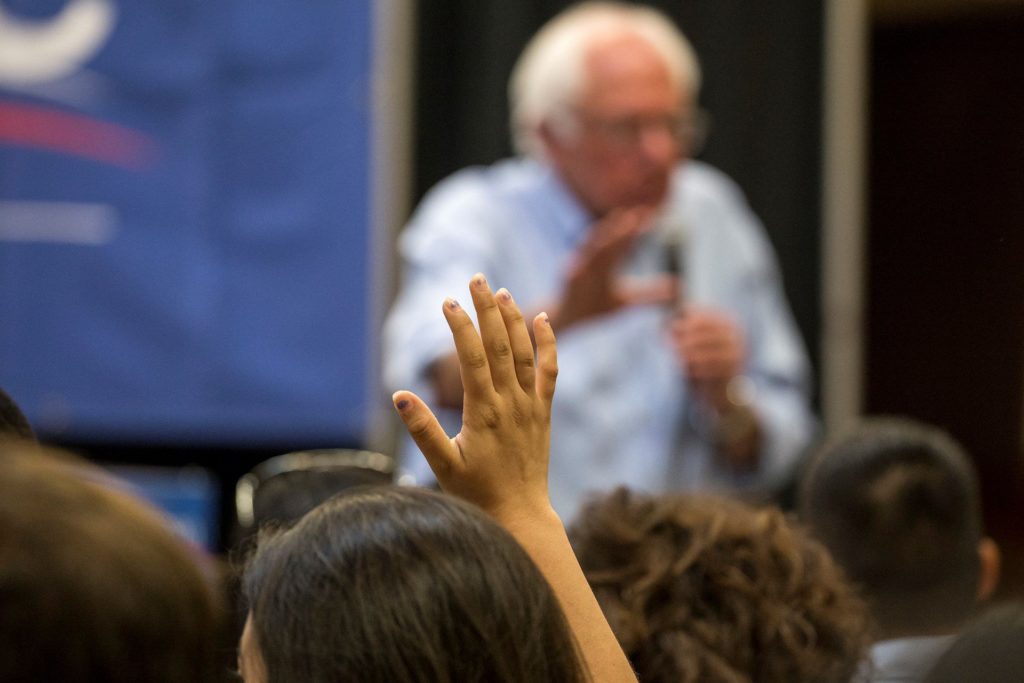Ten Democratic presidential candidates will square off in New York on Wednesday, fielding questions as part of a seven-hour telecast (yes, seven hours) that CNN is billing as an “unprecedented prime-time event focused on the climate crisis.”
Though questions will come from members of the audience, CNN’s description of the event offers some indication of what questions viewers can expect.
In his preview of the town hall-style event, CNN senior analyst Mark Preston writes that global warming “would cause coastal cities to disappear underwater, leaving hundreds of millions of people displaced and forced to migrate to dry areas.
Because of this, Preston says, the UN warns that governments must take “rapid, far-reaching and unprecedented changes in all aspects of society.”
Whether questions that do not accept these premises—that global warming is a crisis and only governments can fix it—will be entertained remains to be seen. But CNN’s description suggests the event may be closer to Greta Thunberg’s “I Want You to Panic” approach to climate change than level-headed analysis that explores the costs and benefits of inaction and action on climate change.
Regardless of CNN’s approach to the issue, here are four climate change-related questions audience members should consider asking.
1. If climate change is a dire threat, why do Democrats reject nuclear power?
Nuclear energy is safe, comparatively cheap, reliable, and generates zero greenhouse gasses. For this reason, the Union of Concerned Scientists has said nuclear energy is necessary to address climate change. It’s already a proven solution to CO2 emissions. France and Sweden, two nations that have far lower per capita carbon emission rates than the US, rely heavily on nuclear power, generating 72 percent and 42 percent of their energy from it, respectively. The US, on the other hand, generates just 20 percent of its power from nuclear energy.
Despite its efficiency and low-cost, prominent Green New Deal plans from Rep. Alexandria Ocasio-Cortez and Sen. Bernie Sanders either reject expanding US nuclear capacity or propose phasing it out entirely.
2. Are less-invasive climate change solutions like planting more trees preferable to government regulations and taxes?
A new study in Science magazine says one solution to the fears surrounding CO2 emissions is surprisingly simple: plant more trees. The study says that increasing the planet’s forests by an area the size of the United States “has the potential to cut the atmospheric carbon pool by about 25%.”
That is no small order since we’re talking about an area more than five percent of the Earth’s land surface area. Yet it’s likely far more achievable than becoming a CO2-free economy by 2050.
Assuming it could be achieved, would an international policy dedicated to increasing forestation not be preferable to taxing CO2?
3. Are you aware that climate-related deaths are today at historic lows and why that is?
The environmentalist Dr. Bjorn Lomborg points out that since the 1920s, atmospheric CO2 concentrations increased by about 30 percent to more than 400 ppm, and global average temps increased by roughly 1°C. Yet during that same timeframe, climate-related deaths plummeted by 99 percent.
The reason for this is that people in wealthier nations are more resistant to climate-related deaths than people in poorer nations, and the 20th century saw an unprecedented increase in economic growth (see below). This suggests the best way to protect people from climate change is with economic growth, not austerity. As it happens, the “socio-economic pathways” (SSPs) literature makes it clear that the most abundant future is one that relies on fossil fuels and free markets.
4. Do you believe Americans could stay warm without fossil fuels?
About 65 percent of all electricity in the US is generated by fossil fuels, according to the Energy Information Administration. This actually increases during the coldest months of the year. During cold snaps, according to the Department of Energy, independent system operators (ISOs) can depend on coal, nuclear, and natural gas for more than 80 percent of the electricity they generate.
Most parts of the country, however, aren’t heated with electric power. Natural gas—a fossil fuel—is the primary fuel for warming homes in most parts of the country by a wide margin. Kerosene and fuel oil also account for a sizable portion in some parts of the country. On a continent of about 3.8 million square miles that sees temps reach as low as 13 degrees Fahrenheit in Atlanta and -4 degrees in New York City, fossil fuels are what fight the freeze, keeping hundreds of millions of Americans warm during the coldest months.
Jon Miltimore
Jonathan Miltimore is the Managing Editor of FEE.org. His writing/reporting has appeared in TIME magazine, The Wall Street Journal, CNN, Forbes, Fox News, and the Washington Times.
This article was originally published on FEE.org. Read the original article.




